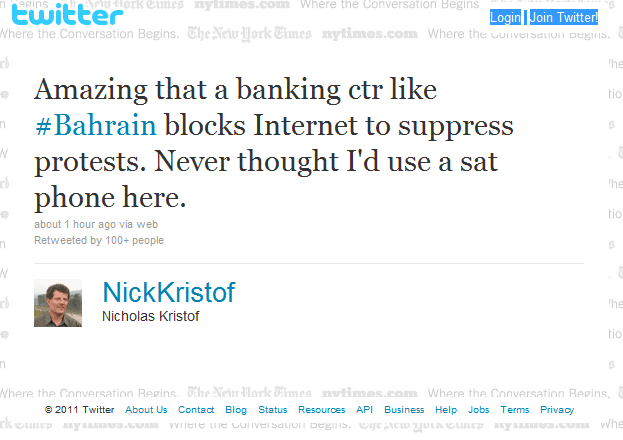In the aftermath of Hosni Mubarak’s fall as Egypt’s dictator, Internet experts have begun to examine how the Egyptian government managed to accomplish what many thought impossible – to completely unplug the Internet across the entire country.
As the protests continued to build momentum at the end of January, the Egyptian government took increasingly severe steps to curtail the use of the Internet, first banning social media sites such as Facebook and Twitter, which had been credited with helping galvanize the protests, then finally shutting the door on the Internet entirely, not just among the protestors but the entire Egyptian public. They kept the Internet off for five days before resuming service.
It was the first time that a government had succeeded in blocking the Internet entirely. Previously, Internet experts believed that the wily nature of the Internet – its ability to push information down numerous channels, preventing any one path from stopping the flow of information – would undermine efforts to block it.
But according to the New York Times, Egyptian Internet engineers, studying how the government operated, discovered that the country’s Internet connection was just as much under the government’s control as anything else.
For all the Internet’s vaunted connectivity, the Egyptian government commanded powerful instruments of control: it owns the pipelines that carry information across the country and out into the world.
Internet experts say similar arrangements are more common in authoritarian countries than is generally recognized. In Syria, for example, the Syrian Telecommunications Establishment dominates the infrastructure, and the bulk of the international traffic flows through a single pipeline to Cyprus. Jordan, Qatar, Oman, Saudi Arabia and other Middle Eastern countries have the same sort of dominant, state-controlled carrier.
Engineers said that the government owns the fiber-optic cables that transports the information, and has the authority to order a shut-down. Of course, taking the unprecedented step of blocking all Internet activity, both within the country and between countries, also blocked all Internet-based economic activity at an incalculable cost, not to mention the damage to the country’s image in the eyes of international investors.
Despite the price Egypt has paid, however, other Arab dictatorships appear to be following a similar model in recent days. New York Times columnist Nicholas Kristof tweeted about the massive slowdown in Bahrain’s Internet connection, noting he was forced to use his satellite phone for information.
It remains to be seen if Bahrain succeeds in stopping protest by stopping the Internet – a tactic that completely failed in Egypt. As Internet expert Andre Oboler noted in an article that appeared during the Internet blackout in Egypt:
If we think of the internet as river, with little boats carrying boxes of “YouTube,” “Facebook,” “Twitter,” “e-mail,” and other types of messages, what Egypt has done upstream is build a giant dam. The problem with dams, of course, is that the pressure will continue to build.
As days of protest sweep across the Arab world, it is difficult to believe that blocking the Internet will stop people from pouring out into the streets. Egypt may have found that way to block the Internet’s flow of information, but it’s also likely that the cost will ultimately be deemed too high.


